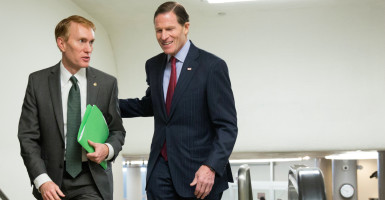Looking to protest a budget agreement that increases spending by $80 billion over two years, conservatives may be inclined to advance appropriations bills that include controversial riders, such as a provision to defund Planned Parenthood.
“Absolutely conservatives should push hard and not back down,” said Sen. James Lankford, R-Okla., in an interview with The Daily Signal.
President Barack Obama is already warning Republicans to not include “poison” riders, and Senate Minority Leader Harry Reid is threatening to block any spending bill that has “ideological, short-sighted, crazy” ideas.
While the Boehner-Obama budget deal set spending levels for the next two years—until after the 2016 election and Obama’s presidency—Congress must still adopt spending bills by the end of the year that dictate where the money is spent.
Potential riders besides the provision to end taxpayer funding for Planned Parenthood could include measures to implement sanctions on Iran; punish sanctuary cities, where local law enforcement officials don’t cooperate with federal immigration authorities; and prohibit the Obama administration from implementing new greenhouse gas regulations on power plants.
Democrats and Obama would never go for any of those provisions, but Lankford argues that the appropriations bill is the place to make a point.
“Appropriations should be the place to find inefficiencies within government funding and to take away funding and put it towards something better,” Lankford said. “Congress has the power of the purse, so this is the exact vehicle to do this. If we want to stop things the Obama administration shoves down our throats, we have to do it with appropriations bills.”
The debate will likely play out in a very public way as Congress, facing a Dec. 11 deadline, pursues a sweeping, all-encompassing omnibus spending measure that combines all the appropriations for the various agencies into one bill.
In a world of so-called regular order, which has been rare in recent years, lawmakers would pass 12 individual bills appropriating money for different government departments. Those bills would abide by the top-line spending levels required by the budget agreement, which acts more like a blueprint.
Earlier this year, Republican-led appropriations committees in both chambers tried to move spending bills through the regular process, but those stuck to spending levels below the old spending caps.
Arguing that the bills did not spend nearly enough money on domestic government programs, Reid and Senate Democrats prevented any appropriations bill from being considered, forcing negotiations between congressional leaders and the White House that led to the big two-year spending deal.
Now that the spending caps have been lifted for fiscal years 2016 and 2017, those previous appropriations bills are mostly irrelevant, though appropriators will likely stick to the principles of the unpassed bills during negotiations.
With a short-term continuing resolution expiring Dec. 11, lawmakers are pressed to smoosh funding—and, potentially, policy provisions—into one bill.
Under a tight time frame, and facing limitations in the Senate, some Republicans are doubtful that the appropriations bill is the place to earn policy victories.
“What’s going to happen, I suspect, is that Republicans are likely to push hard on getting as many limitation amendments (policy riders) in the omnibus,” said Rep. Charlie Dent, R-Pa., in an interview with The Daily Signal.
“However, the number of riders will depend on how many Republicans in the House will vote for the underlying omnibus. If a number of members insist on riders but don’t vote for the bill, it makes talks much harder. The lack of Republican votes for the budget agreement does not bode well for policy riders being successful on the omnibus.”
Lankford argues that conservatives who are steadfastly opposed to the entire idea of an omnibus spending bill, and bitter about the fact that this one will increase spending, could come around if it contains policy provisions they like.
“If the spending agreement just spends more than the previous year, and breaks the budget caps, why should someone support that?” Lankford said. “The key is going to be what we get into the riders. If we [see] good policy in there, we could support it [the overall omnibus bill].”


























